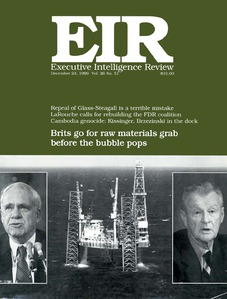Interviews
William Pepper
The attorney for the family of Martin Luther King, Jr. in the historic case which has finally shattered the wall of silence over the conspiracy to murder the great civil rights leader.
Departments
Editorial
World-strategic significance of Mideast talks.
Strategic Studies
Cambodia genocide: Kissinger and Brzezinski in the dock
by Michael O. Billington
Oligarchical spokesmen are demanding an international tribunal to try leaders of the Khmer Rouge, the genocidalists who they helped put into power, to cover up their own crimes, and to destabilize Cambodia once again.
Learn from the past to save the future
by Gail G. Billington
The Cambodians are handling the war crimes tribunal very carefully, to avoid spooking former Khmer Rouge soldiers into fleeing to the jungle and renewing war.
Economics
As the old year passes, cries of ‘crash’ ring in the new
by Marcia Merry Baker
Just as Lyndon LaRouche forecast during the early days of 1999, during the past year the hopelessly bankrupt world financial system lurched into a “boundary condition” state, and only foolish people blinded by their own greed are still denying the collapse is imminent.
Documentation: Commentaries in the world press on the coming financial crash.
Banking deregulation: an assault on America’s national sovereignty
by John Hoefle
The Glass-Steagall Act, passed under the direction of President Franklin Roosevelt explicitly to limit the power of the international bankers over the U.S. economy, was a decidedly political act. Its repeal is a serious mistake.
How the Glass-Steagall Act struck a blow against Wall Street’s power
by Richard Freeman
Deregulation: a license to steal
by John Hoefle
The irony of a dangerously out of control group of parasites proclaiming that they are being “over-regulated,” should not be lost on anyone watching the bankers running roughshod over the very people they claim they want to serve.
WTO summit failure: a view from Malaysia
by Ramon Navaratnam
Business Briefs
Feature
Brits go for raw materials grab before the bubble pops
by Jeffrey Steinberg
The Center for Strategic and International Studies and the London Financial Times energy division co-sponsored a conference in Washington on “The Geopolitics of Energy into the Twenty-First Century.” It was warmed-over British raw materials geopolitics, borrowed from Britain’s nineteenth-century “Great Game” which is leading the world toward war.
The myth of geopolitics
by Lyndon H. LaRouche, Jr.
Geopolitics was always a fairy-tale, created to hide the British monarchy’s actual motives—to destroy both Russia and Germany, and to take over control of the U.S.A.
Conference at CSIS: geopolitics of energy
by Scott Thompson
Lunatic Brzezinski’s ‘New Carter Doctrine’
by Scott Thompson
He’s pushing a re-tooled version of his old 1970s “Arc of Crisis” geopolitics, fostering a “Zone of Instability” in Central Asia, directed at destroying the great nations of Eurasia.
Administration views Baku-Ceyhan pipeline as one alternative
by William Jones
Despite its potential advantages, an oil pipeline that detours around Russia can become an easy pawn in the “Great Game” being played by Madeleine Albright and other lackeys of British geopolitics.
The Silk Road Strategy Act: Brownback’s bill is a geopolitical hoax
by Suzanne Rose
International
Russia, China counter threat to world security
by Mary Burdman
A close look at the Russia-China Joint Declaration issued on Dec. 10 by Russian President Boris Yeltsin and China’s President Jiang Zemin, shows that it is not merely a show of sabre-rattling, but rather it is a result of a profound shift under way in relations among the three main Eurasian powers: Russia, China, and India.
Documentation: Extracts from the Joint Declaration.
A Russian debate
by Roman Bessonov
St. Petersburg correspondent Roman Bessonov examines the sea-change under way in Russian thinking.
Debate erupts on option for U.S. supply to Garang’s war against Sudan
by Linda de Hoyos
What Americans must know about democracy in Malaysia
by Hardev Kaur and Ramon Navaratnam
Two of Malaysia’s leading commentators discuss the conduct and results of the Nov. 29 elections.
International Intelligence
National
Stench of racism surrounds indictment of Wen Ho Lee
by William Jones
The Dec. 10 arrest of American nuclear physicist Wen Ho Lee was an act of politically and racially-motivated scapegoating that has sparked anger from Asian-American constituency groups, and concern over this new McCarthyism.
LaRouche: Rebuild FDR coalition and retake the Democratic Party
by Lyndon H. LaRouche, Jr.
Portions of an address which the Democratic Presidential pre-candidate delivered on Dec. 11 via satellite and Internet to supporters in Los Angeles.
International support for LaRouche’s campaign
Is Louis Freeh re-creating J. Edgar Hoover’s FBI?
by Edward Spannaus
Campaign Watch: Al Gore goes to pot
by Michele Steinberg
Memphis jury finds conspiracy in Martin Luther King assassination
by Edward Spannaus
A jury of 12 citizens has determined that a far-reaching conspiracy, involving agencies of the United States government, was responsible for the 1968 assassination of Dr. King.
Documentation: Excerpts of Attorney Pepper’s trial summation.
Trilaterals incite China-bashers on Panama Canal
by Carlos Wesley
National News



